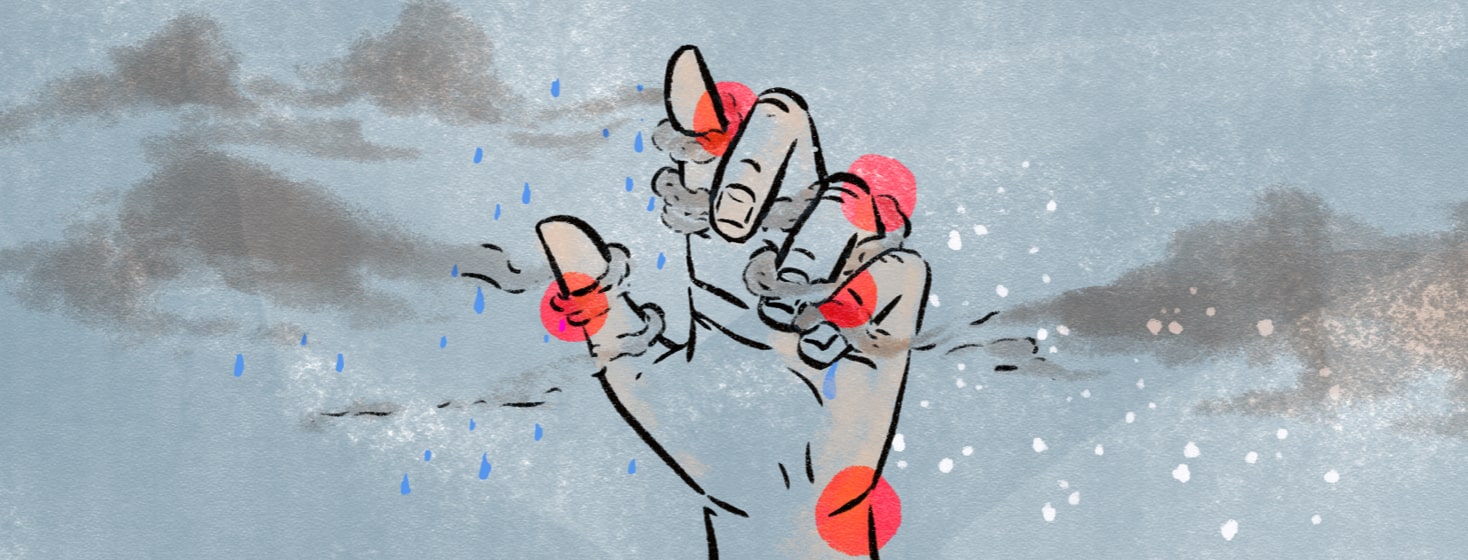Dreary Days and Joint Pains
When I woke up on a rainy, crisp day in October, I could immediately feel the ache in my hands. I felt the dull throbbing in my finger joints as I reached for my cell phone. The rings on my fingers felt a little more snug and I could barely pull them off. I knew then that my psoriatic arthritis was flaring.
Was it the beautiful, cool, fall weather that was causing my joints to ache? Was it the rain that was causing my pain? In all my internet searches and inquiries, I could never find a straight answer.
In all honesty, I think even the best doctors know very little about the relationship between weather and joint pain. Yet countless people claim to feel more pain and stiffness when the forecast is less than desirable.
Does poor weather negatively affect joint pain?
The short answer is that we don’t know. While many physicians have observed their patients, especially those suffering from chronic pain, feel more joint pain, stiffness, and aches on cold or rainy days, there’s no proven connection between weather and joint pain. But there are theories.
One theory is that people with chronic joint pain could be sensitive to barometric pressure changes. Barometric pressure is the measurement of air pressure in the atmosphere.
Rain usually comes with a drop in barometric pressure and this low pressure could irritate sensitive nerves, causing tissues in your body to swell. This would make your muscles and tendons contract and expand, creating pain in the joints.
Another theory has to do with reduced blood flow to the extremities. When temperatures drop, your body conserves heat by lessening blood flow to your extremities and pumping more to your heart and lungs. This can result in joint pain and stiffness.
Lower temperatures also thicken the synovial fluid in your joints. The synovial fluid absorbs the shock in your joints and is usually of egg-white consistency. When temperatures drop, the fluid thickens, which limits its ability to flow freely.
What kind of weather will make my PsA symptoms better?
Just like we don’t know why cold and wet weather increases joint pain for most people, we don’t know why warmer, drier climates relieve pain. But for most people, it does seem to help. Myself included.
Is this because my arthritis is specific to psoriasis and the warmer climates seem to elevate my skin symptoms? I don’t really know.
In other cases, heat actually worsens arthritis symptoms. Humidity can expand tendons, ligaments, and muscles, causing the pain to worsen. Hot weather can also encourage you to move around less, causing your joints to stiffen. Like most things health-related, there’s no one-size-fits-all remedy. Treatments are often on a case-to-case basis.
Plan Ahead
In the winter months, I practically live in my weather app. Though I can’t predict nor change the weather, I can try to get ahead of it and prepare for the worst. Especially when I know that I have a busy day ahead of me. Here are some things that you can do to keep yourself ahead of the storm:
Stretch
Keep your body and your joints moving. Do some light exercise or stretches in the morning to loosen up your body.
Keep the heating pads handy
I always have a heating pad ready on those super cold, damp days to warm my bones up. A warm shower usually doesn’t hurt either.
Massage
Rubbing the achy joints could provide some temporary relief. Consulting a physical therapist isn’t a bad idea either.
Over-the-counter medication
Taking some acetaminophen or ibuprofen prior to a flare is helpful. Always consult your doctor when taking any medications.
Avoid inflammatory foods
Take a break from fried foods and sugar as they may increase inflammation and make joint symptoms worse.
Relax!
Remember to relax. Be kind to your body when you’re having a rough day. Be kind to your mind as well. Chronic pain and mental health go hand-in-hand. Take care of yourself as a whole.

Join the conversation